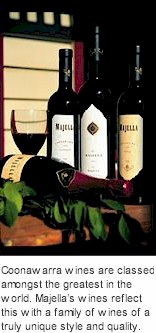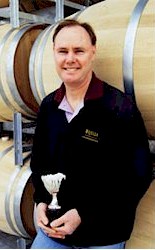


The property on which Majella now stands was originally owned by Frank Lynn, and bought by his nephew, George, in 1960. George and Pat Lynn kept Merinos for wool production on their farm about ten miles away, and had always wanted some good Coonawarra country for their up-and-coming prime lamb enterprise. Viticulture, however, was not on their agenda until 1968.

George had always been great friends with Eric Brand. Eric had just started producing his wines under the Laira label and was selling some wine to the Hardy wine company. Brian was interested in planting a vineyard on the Majella property and in 1968 went ahead and planted 6 acres of Shiraz. Eric offered to buy the grapes to produce wine for Hardy's and the future looked rosy. There wasn't a lot of money in it, but it complemented the sheep enterprise, so eventually some 70 acres were planted - about 60% Shiraz and 40% Cabernet Sauvignon.
However, all good things come to an end, and the Hardy deal fell through just as the vines were maturing. Things were tight in the 70's. Demand for grapes, particularly Shiraz was very low, and there were a couple of years when 30 or more tonnes of premium Shiraz grapes were left to rot.
This was the start of a long relationship between Wynn's and Majella, a relationship that continued for over 20 years. Since 1989 Majella have continued planting new vineyards and at present have about 150 acres under vine. Most of the new plantings have been Cabernet Sauvignon, but there are some small areas of Merlot and Riesling planted as well.

The Majella winegrowers had always made a bit of wine up from their own select grapes, and knew that the quality was very good. After prompting from many of their peers, in 1991 they made up 600 cases or so of Shiraz.
The wine was vintaged at Brand's "Laira" winery (the link with Brand's won't go away) under the ever watchful eye of their winemaker, Bruce Gregory. This hit the market in 1993 and was received exceptionally well. The wine was good, the packaging looked good and the release sold out in no time.
Majella's production level soon reached the stage where new winemaking facilities were warranted, and high tech winemaking equipment was installed. Bruce Gregory joined as winemaker in January 1999 and produced a crackerjack vintage first up.
What happened to the sheep? They're still there although there's not much money in wool these days. The Majella winemakers still run about 3,500 Merino wethers on their remote farm south-west of Penola and raise about 400 prime lambs at Coonawarra.






















